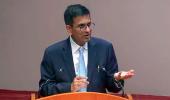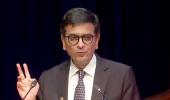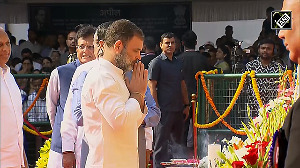The anti-corruption ombudsman Lokpal has disposed of a complaint alleging corruption against former CJI DY Chandrachud for being "barred by jurisdiction", according to an official order.

A complaint was filed on October 18, 2024, "against the sitting Chief Justice of India (CJI) as on that date, for alleged abuse of office, amounting to corruption and malicious exercise of power to favour and protect a certain politician and political party", it said.
CJI Chandrachud demitted office on November 10.
The Lokpal, in its order, examined in detail if a sitting CJI or a Supreme Court judge was amenable to its jurisdiction under Section 14 of the Lokpal and Lokayuktas Act and decided to "eschew from dilating upon the diverse allegations contained in this complaint running into 382 pages".
"We say no more," according to the order dated January 3.
"In light of the above, we dispose of this complaint as being barred by jurisdiction," said the order by Lokpal chairperson Justice AM Khanwilkar and five other members.
The order said the complainant was free to pursue other remedies, as permissible in law.
"We may not be understood to have expressed any opinion on the merits of the allegations, one way or the other including about the maintainability of the legal remedies to be resorted to by the complainant," it added.
The Lokpal examined different provisions under Section 14 -- "jurisdiction of Lokpal to include prime minister, ministers, members of Parliament, groups A, B, C and D officers and officials of central government" -- of the Act.
"The textual and even contextual interpretation of this provision would lead us to the conclusion that only the persons referred to with their designation or description in this provision, have been made amenable to the jurisdiction of the Lokpal, as being a public servant against whom the Lokpal is bestowed with the duty to inquire or cause an inquiry to be conducted into any matter involved in, or arising from, or connected with, any allegation of corruption within the meaning of provisions of the Prevention of Corruption Act, 1988 (for short, PC Act 1988), made by way of a complaint to the Lokpal," it said.
Indubitably, a sitting judge or CJI would not come within the ambit of clauses (a) to (e), (g) and (h), the order said.
"The only expansive clause that may come into play is Clause (f), which, however, predicates that any person who is or has been a chairperson or member or officer or employee in any 'body' or board or corporation or authority or company or society or trust or autonomous body (by whatever name called) 'established by an Act of Parliament' or wholly or partly financed by the central government or controlled by it," it said.
At first impression, there can be no debate about the fact that the Supreme Court is a body of a group of judges associated for common purpose or object, the order said.
"The judges, generally including that of the Supreme Court, also come within the ambit of expression of public servant within the meaning of Section 2(c) of the PC Act," it said.
The judge of a court would not come within the excepted category of public servant in respect of whom jurisdiction is exercisable by any court or other authority under the specified acts, the order said.
"In that sense, the judge of any court would be a public servant and also can be proceeded with for having committed an offence of corruption, including under the PC Act, as ordained by the Constitution Bench of the Supreme Court, in K Veeraswami vs Union of India and Ors...," it said.
The moot question is "whether the Supreme Court of India is a body established by an 'Act of Parliament'," the order said and added the expression used in Section 14 of the Act was very definite and did not leave any room for interpretation.
"We need to remind ourselves of the cardinal principle of interpretation of statutes that while interpreting any penal statute, strict interpretation must be preferred," it said.
"In other words, it will have to be first explored whether it is open to take the view that the Supreme Court of India has been established by an 'Act of Parliament'. To this, the answer is an emphatic 'NO'. For, the Supreme Court of India has been established by virtue of Article 124 of the Constitution of India," it added.
Suffice it to observe that the Supreme Court, even though a body of judges, does not come within the ambit of expression "body" employed in Section 14(1)(f) of the Act, as it is not established by an "Act of Parliament" as such, the order said.
Further, the Supreme Court is neither wholly or partly financed by the central government or controlled by it as such, it said.
The same logic must apply to the judges of the Supreme Court or the CJI, namely, as not being wholly or partly financed by the central government or controlled by it as such, the Lokpal said.
"As a concomitant to this view, it must follow that the sitting judge of the Supreme Court or the Chief Justice of the Supreme Court will not be amenable to the constricted jurisdiction of the Lokpal of India in terms of Section 14 of the Act of 2013," the order said.
The anti-corruption ombudsman, however, clarified that the view "propounded hitherto" was only to consider the status of the judges and the CJI of the Supreme Court, having been established by virtue of Article 124 of the Constitution.
"This view may not squarely apply to the judges of the other courts, including high courts...," it added in the order.











 © 2025
© 2025